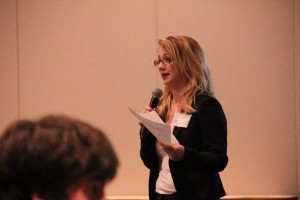Amnesty International raises questions about freedom of expression in SOCHUM

Amnesty International addresses the delegates of SOCHUM about freedom of expression and protection of journalists
By YENA SEO, THE WASHINGTON POST
Following heavy debate regarding the freedom of expression and protection of journalists in the Social, Cultural and Humanitarian committee (SOCHUM) at the 61st session of the Harvard Model United Nations Conference, human rights-focused Amnesty International visited delegates to discuss various issues surrounding freedom of the press and raise concerns about the flow of debate in committee.
“We believe that journalists are activists and advocate for those who cannot speak for themselves,” the delegate representing Amnesty International said. “However, we have a few concerns regarding some of the rhetoric that is being used in committee.”
Amnesty International drew attention to the “prisoners of conscience” in many of the countries present in committee, who were being held for expressing their freedom of speech and freedom of the press. The delegate urged nations holding such prisoners to free them immediately, and also emphasized that protective measures needed to cover journalists on a variety of levels.
“Not all journalists in conflict zones are foreign,” the delegate representing Amnesty International said. “Many local journalists are in danger within the countries and regions they are reporting in.”
Several delegates approached Amnesty International outside of the committee room, seeking the organization’s advice and input on possible solutions. Bangladesh, working with South Korea, wanted to make a “Journalists for Journalists” convention which would create annual reports about freedom of expression, and also sought to create a Regional Access for Media Protection program that would provide training and defense skills to journalists, as well as legal assistance.
“I’ve been approached by the United States, had conversations with Spain, and talked to countries like Bangladesh,” the delegate representing Amnesty International said. “We are an organization with a strong moral stance, however, so there may be issues in terms of ideological differences when working with some of these countries.”



Recent Comments